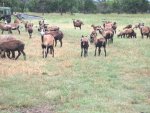Flagwaver- this is really answering your other question about "can you homestead this hill"...
Please, if there is ANY other option, look for something else! Homesteading is fascinating, wonderful- and hard work. Doing it on less than optional land makes it harder yet.
A steep hill is so far beyond "less than optional" I can't begin to describe it. Just for starters, you'rel going to run into difficulty doing anything from tilling the soil, to mowing the grass, to building fences.
You do with what you have- that's life. But you don't HAVE this yet, and if you're going to spend your hard earned money, spend it on something that is more likely to let you support your family in hard times.
Sheep require good fences, and building a tight fence on level ground is challenging. Building one on less than level ground gets into the "interesting" category.
Also, sheep are notoriously stupid! And they WILL get "cast"- lay down on a slope with their legs uphill and DIE because they can't get up.
On the specific questions, I haven't raised sheep. I've doctored the neighbors sheep enough to be able to doctor them, deliver their lambs and know that I prefer animals with brains!
But... from what I gather, you can expect around 8# of wool from a mature ewe. You won't need many sheep to knit a few sweaters! The "how much land" is trickier, because land isn't land.... You might need 3 acres of steep land that doesn't grow much. Or you might find that 4 sheep can't keep up with 1/2 an acre of fairly level, fertile land.
Sheep eat mostly forage. Varieties will depend on where you are. I believe they can be prone to bloat on very lush pastures, like heavy alfalfa or clover. And you don't want pregnant ewes to get fat... they tend to die at lambing from things like toxemia and ketosis. They also are really good at stripping the bark from trees and eating your flowers, if you don't keep them away from them!
The local Amish use sheep as lawn mowers and weed whackers. They buy a weaned lamb and tether them, moving the tether frequently as they graze the weeds and grass down where they were. They do a neat job of grazing- much neater than cows- and their manure is in neat little pellets, not sloppy "cow pies". So, it would be possible to keep them without fences, at least at first. This wouldn't be practical if you have predator problems, though, or you often don't have someone at home to keep an eye on things.
Predators are almost always the biggest problem sheep farmers face.
I'm sure there must be a "sheep raising the modern way" book out there. Gardenway books, maybe, or Storeys?
I'd start there.
Summerthyme


